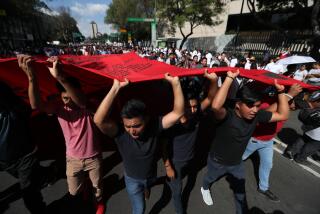How Far Will Cristiani Go?
By stating publicly for all to hear that members of his country’s armed forces were involved in the murder of six Jesuit priests and two women bystanders, President Alfredo Cristiani took a small but courageous step towards affirming that his government respects human rights. But it will take more than that to persuade people that things are changing for the better in El Salvador.
The killings took place during fierce street fighting in San Salvador late last year. Armed men invaded Jesuit-run Central American University, dragged the priests from their beds, beat and shot them. The priests’ cook and her daughter were also killed to eliminate witnesses. Even after a decade of often bloody civil war, the heinous killings sparked worldwide outrage. The priests were respected scholars whose research might have helped bring peace to El Salvador.
In his announcement, Cristiani gave no details of how the government’s investigation is going. The right-wing president said only that “it has been determined that elements of the armed forces were involved.” But given his earlier denials of any government involvement, this alone was a noteworthy admission. Cristiani is under pressure from Washington to clear up the Jesuit murder case. Some key members of Congress are threatening to halt U.S. aid (now running at more than $1 million a day) unless the killers are brought to justice. The warnings were sparked by the widespread suspicion that the murders were the work of government security forces or death squads. The only eyewitness to the incident, a cleaning woman, said the killers wore military-style uniforms. While the accuracy of her account has been questioned, it’s telling that many Salvadorans are ready to believe their army is capable of such an atrocity.
The Salvadoran military had a terrible human-rights record long before we began helping fight a leftist rebellion in 1980. So a key element of the U.S. strategy is to clean up the Salvadoran military--the single most powerful institution in a notoriously weak government--by making it less brutal, less corrupt and more respectful of civilians. Whether or not that strategy is working at all is a matter of much debate.
In 10 years of fighting, Salvadoran army units have been linked to a number of human-rights violations. A few enlisted men have been convicted of crimes, such as the rape and murder of four U.S. churchwomen in 1981. But no Salvadoran officer has ever been convicted. While it took nerve for Cristiani to link the murders to the military, he’ll need even more gumption to push the investigation to its conclusion--no matter how painful it may be for his colleagues in uniform.
More to Read
Sign up for Essential California
The most important California stories and recommendations in your inbox every morning.
You may occasionally receive promotional content from the Los Angeles Times.










